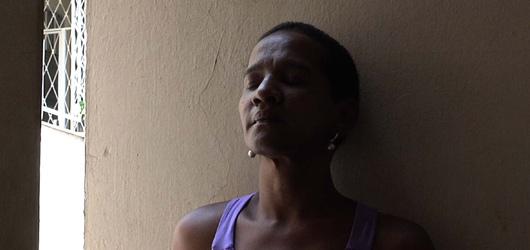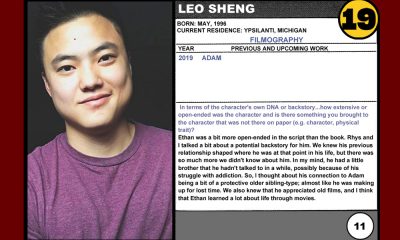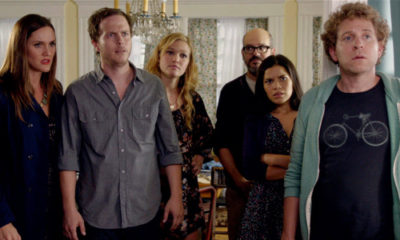Retro IONCINEMA.com
Cannes Interview: Ricardo Alves Junior (Permanencias)
A graduate in Film Direction at Universidad del Cine in Buenos Aires, Argentina, Brazilian born Ricardo Alves Júnior’s first short movie “Material Bruto” (Raw material), received over 10 awards at international festivals, and his second film, “Convite para jantar com camarada Stalin” won the award for Best Experimental Short Film at the International Short Film Festival of Rio de Janeiro; Best Short Film, Best Director and Best Photography at the 40th Film Festival of Brasilia, plus Special Mention “Film of Tomorrow” at the International Festival of Short Films, in Belo Horizonte. This May, Ricardo’s 32-minute film “Permanences”, was an official selection at Cannes Critic’s Week. Here is our interview with the filmmaker.
A graduate in Film Direction at Universidad del Cine in Buenos Aires, Argentina, Brazilian born Ricardo Alves Júnior’s first short movie “Material Bruto” (Raw material), received over 10 awards at international festivals, and his second film, “Convite para jantar com camarada Stalin” won the award for Best Experimental Short Film at the International Short Film Festival of Rio de Janeiro; Best Short Film, Best Director and Best Photography at the 40th Film Festival of Brasilia, plus Special Mention “Film of Tomorrow” at the International Festival of Short Films, in Belo Horizonte. This May, Ricardo’s 32-minute film “Permanences“, was an official selection at Cannes Critic’s Week. Here is our interview with the filmmaker.
Anny Gomes: Your movies have many characteristics from minimalist cinema. The true nature of the character is put in evidence. Do you believe focusing on the character’s physique is a trademark of your movies? What do you expect when you put your viewers in a certain trance while we “live” the character’s lives?
Ricardo Alves Junior: Exactly what I propose in my films is an experience of contemplation, so difficult today since we live in a mediated world and multiplied by the accelerated production and reception of images. Before I even turn on the camera, I like to be in the space of the characters. I always think of the word ‘mystery’. That is why I like to work with the silence between people, and when they speak, they talk about a singular moment of their lives. I enjoy working with minimal elements to represent the world and the people. We live in a world where everything can be planned. Permanências is a film that emphasizes the minimal gestures, looks, breath. I believe that the history of each “character” of the film is on the mapping of the face, it is in writing, the marks that life forms on the skin.
Gomes: We can tell that the camera work on your previous films ‘Material Bruto’ (Raw Material) and ‘Convite para Jantar com o Camarada Stalin’ (Invitation to Dinner with Comrade Stalin) is objective, as if you wanted to start off an observation and not interfere with the acting. Is that something you plan before shooting, to put the character before the story?
Alves Junior: “Material Bruto”, “Convite para Jantar com o Camarada Stalin” and “Permanências”, all started through observation. To observe people as they are. Before starting to shoot I spend some time with them, listening more than speaking. I observe every gesture, their breathing. I like to see how they relate to that space. In this process, I think about the composition, the light and sounds. My relationship with this process is very important, even if you make a mistake, these unknown paths will allow the movie to be made. First, I observe. And after this observation I make notes, highlight specific elements that will be our guide (script), afterwards I work with the composition (space, bodies, light, movement). In the end, there is the editing, which is a new challenge because the sound is completely remade. I shoot with direct sound but I like to add other sounds to help building the atmosphere.

Gomes: Permanências was shot in a small village in Belo Horizonte just as your previous film. What was the reason to choose the same place to shoot this movie?
Alves Junior: The IAPI village is for me the image of a sinking boat in the city of Belo Horizonte. I see in this place some sort of a ghost that lives in the city. Before 2005 when I shot “Material Bruto”, I already had the desire of making a movie about the village and how I perceived this place. Material Bruto treats the space only as a shooting location for the film, but I wanted to make a movie where the location was also a character.
To shoot Permanências felt like I was exorcising this ghost that followed me for more than 6 years. Every time I was in Belo Horizonte I used to go to this village and thought of transforming that atmosphere in poetry. It did not interest me in telling the story of how it was built, only the weather, the atmosphere of the place and to transform that into images the metaphor of a sinking ship. My goal was to make a movie where people could feel like it is to live in this place for some minutes.
Gomes: Permanências already received an award for the Best Brazilian film at the Janela Internacional do Cinema in Recife. How did you receive the news that your movie was selected for the Cannes’ sidebar and what do you expect of this exposition?
Alves Junior: I was very surprised and pleased. This film has a 34 minute format and this kind of movie in Brazil has less importance in exhibition. I believe that being selected for Cannes will initiate a debate in Brazil about the marginalization of this format in the Brazilian festivals.
Gomes: You studied Film at the Universidad del Cine in Buenos Aires. How does your international experience influence you as a director?
Alves Junior: To study abroad was very important for my daily experience as a filmmaker. I went to Argentina in 2004 right after their economic crisis in 2001, a country where its contradictions were out on the streets of Buenos Aires and found in the conversations people were having at the coffee shops. I saw myself in this foreign land watching what was happening on the streets, as if Argentinians were building their new reality. As an observer and trying to transform this period in poetry was what initiated my residency in Buenos Aires. I believe that the short ‘Convite para jantar com o Camarada Stalin’ is a metaphor of this nostalgia that I felt while being in Argentina.
Another great factor that influenced me was that my first years being a filmmaker happened in the biggest filmmaking Latin American country. Being able to watch films at the Lugones or Malba and in my own University during microcine made me experience a big diversity of possibilities in the cinema world for 4 years. Also, the amount of foreigners studying at my University was very important as well — as this exchange of culture was something very valuable.
Gomes: What is your next project?
Alves Junior: I am working on a film called “Elon Rabin não acredita na Morte” (English translation: Elon Rabin Does Not Believe in Death). In this movie, I work once again with actors from my first film. Just like my previous work, it will be a movie that starts with an observation from a daily routine and mixes fiction and documentary.



























